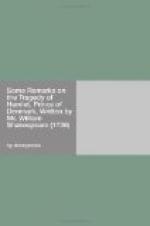Heav’n
Visit her Face too roughly. Heav’n and Earth!
Must I remember? Why, she would hang on
him,
As if Increase of Appetite had grown
By what it fed on; yet within a Month!
Let me not think. Frailty! Thy Name is
Woman.
A little Month; e’er yet those Shoes were old,
With which she follow’d my poor Father’s
Body,
Like Niobe, all Tears; Why she, even she,
(Oh Heav’n, a Beast that wants Discourse
of Reason,
Would have mourn’d longer) married with
mine Uncle,
My Father’s Brother; but no more like my
Father,
Than I to Hercules. Within a Month,
E’er yet the Salt of most unrighteous Tears
Had left the flushing in her gaul’d Eyes,
She married. Oh! most wicked Speed, to
post
With such Dexterity to incestuous Sheets!
It is not, nor it cannot come
to Good.
But, break my Heart, for I must
hold my
Tongue.
“The young Prince, (says this Author in the Tatler,) was not yet acquainted with all the Guilt of his Mother; but turns his Thoughts on her sudden Forgetfulness of his Father, and the Indecency of her hasty Marriage. The several Emotions of Mind, and Breaks of Passion in this Speech, are admirable. He has touch’d every Circumstance that aggravated the Fact, and seem’d capable of hurrying the Thoughts of a Son into Distraction. His Father’s Tenderness for his Mother, express’d in so delicate a Particular; his Mother’s Fondness for his Father, no less exquisitely described; the great and amiable Figure of his dead Parent, drawn by a true Filial Piety; his Disdain of so unworthy a Successor to his Bed: But above all, the Shortness of the Time between his Father’s Death, and his Mother’s Second Marriage, brought together with so much Disorder, make up as noble a Part as any in that celebrated Tragedy. The Circumstance of Time I never could enough admire. The Widow-hood had lasted two Months. This is his first Reflection: But as his Indignation rises, he sinks to scarce two Months; afterwards into a Month; and at last, into a little Month. But all this so naturally, that the Reader accompanies him in the Violence of his Passion, and finds the Time lessen insensibly, according to the different Workings of his Disdain. I have not mentioned the Incest of her Marriage, which is so obvious a Provocation; but can’t forbear taking Notice, that when his Fury is at its Height, he cries, Frailty, thy Name is Woman! as Railing at the Sex in general, rather than giving himself leave to think his Mother worse than Others.”
Page 238.
Enter Horatio, Bernardo, and Marcellus, to Hamlet.
The Greeting between Hamlet, Horatio, and Marcellus, is very easy, and expresses the benign Disposition of the Prince, and first gives us an Intimation of his Friendship for Horatio.




